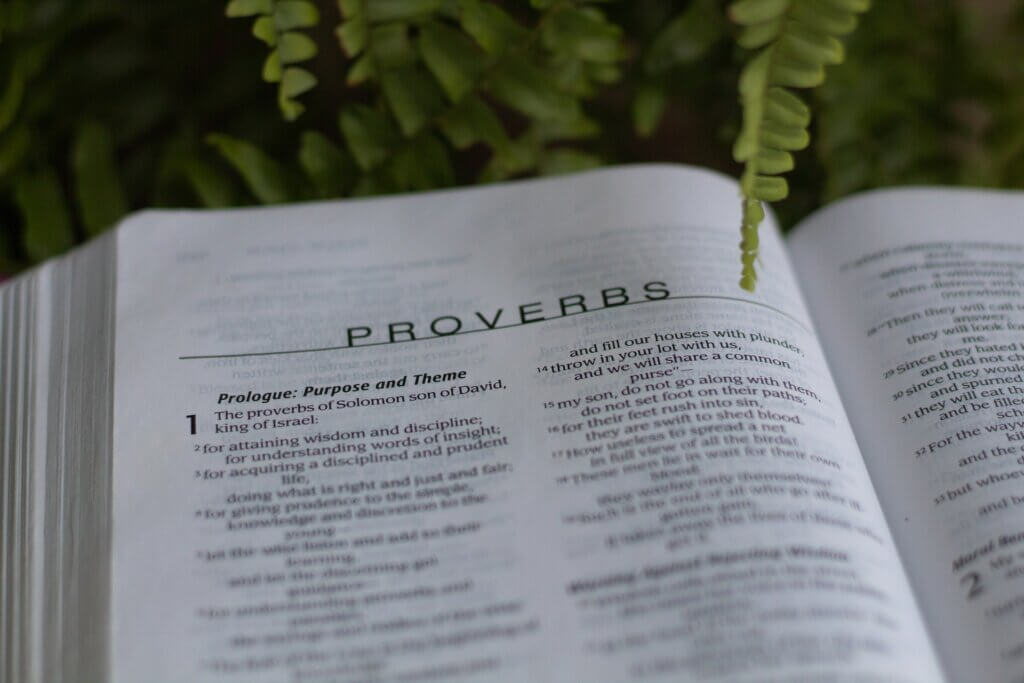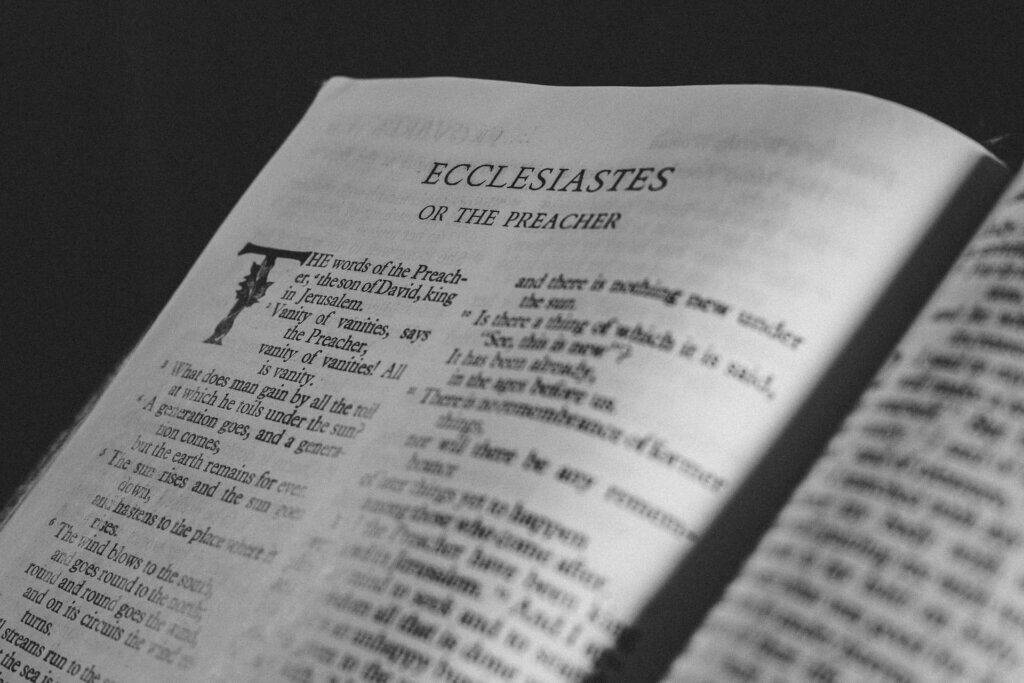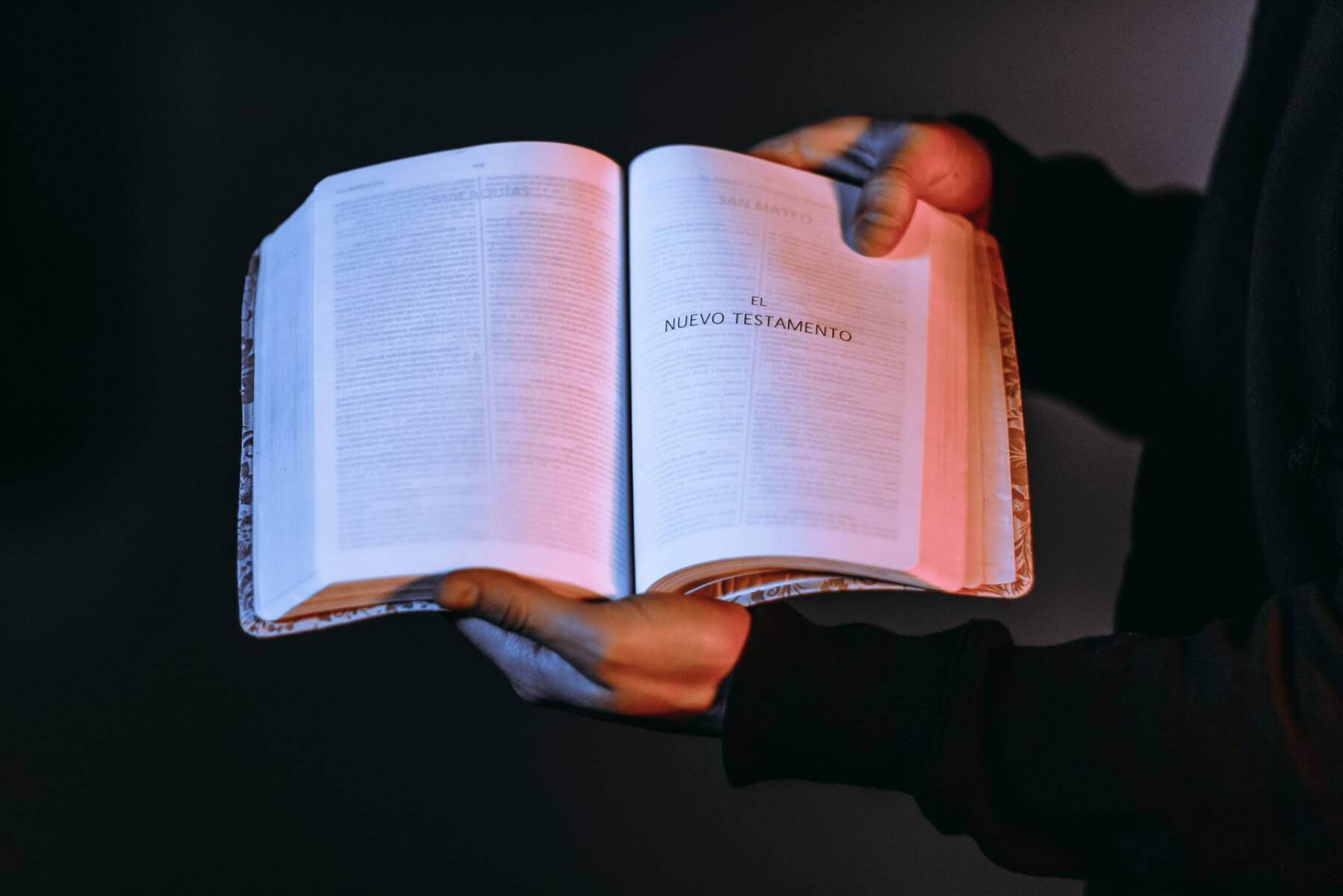The “Wisdom Literature” in the Bible is frequently overlooked and often misinterpreted. The Book of Proverbs and Ecclesiastes are classic examples of this genre. It’s important to note that these books don’t fall under the categories of New Testament narrative, biography, prophecy, or letter.
If you follow a Bible reading plan, you might find yourself reading one Proverb each day – or maybe reading straight through them. Whatever order you read the Bible in, you’ll run into the wisdom literature at some point.
It’s organized in the middle of the Old Testament, along with the Psalms.
Sometimes reading these books of the Bible can be a bit tricky. Let’s look at some of the biggest lessons we can learn from the wisdom literature.
Wisdom Literature Works in the Black and White
Wisdom Literature offers up pithy declarative statements about two paths—wisdom and foolishness. There are shades of gray, judgment calls, and intractable decisions sprinkled throughout the Bible. But Wisdom Literature works in black and white to bring clarity to the only two ultimate outcomes. The foolish choose self-reliance, with predictably disastrous results. The wise choose to rely on the living God, with equally predictable blessings to follow.
Fatherly Instruction in Proverbs
The framework in Proverbs is fatherly instruction. The picture is vivid. These are the words of fathers and mothers who have taken to heart God’s command to raise their children in the “discipline and instruction of the Lord” (Eph 6:4). So they will take great pains to systematically teach their children. “Listen, my son, to your father’s instruction…” is a typical beginning (Prov 1:8; 4:1; 23:19, etc.).

Wisdom from Kings in Ecclesiastes
Ecclesiastes offers a complementary framework of one king offering warning to those kings who will come after. Solomon, the son of David—and the likely author of Ecclesiastes—started well and finished… less so. He famously chose wisdom when God offered him anything he asked for upon his coronation, and he received it to such a degree that he achieved world renown.

Drifting from God’s Design
Over time Solomon accumulated wives who worshiped false gods, and he built up vast military assets. But God had strictly forbidden Israel’s rulers from doing either (Deut 17:16–17). God designed marriage as a one-flesh union for life between a man and women devoted to him and one another. Kings in the Ancient Near East tended to collect vast harems of wives, as a means of displaying their power and wealth, and also as a means of forging treaties with other nations.
It is much harder to go to war with a king who has married your daughter! God did not want the hearts of his kings to be drawn away from worshiping him, and he did not want his kings relying more on their military might and clever treaties than on his preserving power.
Do As I Say, Not As I Did
Solomon looks back over a life of unimaginable fame, success, wealth, and power that somehow still leaves him… empty. “Vanity of vanities… All is vanity,” he declares (Eccl 1:2). None of it filled him up, none of it satisfied him. He sucked the marrow out of life—more than any other person who ever lived—and he has lived to tell about the futility and frustration of it all. While Proverbs offers warnings and practical advice to the young, Ecclesiastes offers sober end-of-life reflections to those tempted by power, pleasure, and the pursuit of false versions of the good life.
Solomon holds a mirror up to the human heart, and puts its restlessness on full display. The human heart, contrary to a myriad of pop psychology books, is not an empty love tank or love bank. Instead, the human heart is a restless thing. The human heart is always in motion—running from what it perceives as a threat, and running after what it thinks will bring satisfaction. Ecclesiastes, if read carefully, will save the reader from wasting their life in the futile pursuit of satisfaction that never comes.
Solomon describes the typical human way of being in the world as being similar to a person who drinks salt water to quench their thirst. Not only does their thirst remain unquenched, it actually is aggravated and intensified. Cravings lead to indulgence, which lead to even worse cravings. The hangover is worse than the binge.
Wisdom Literature Promotes Principles, Not Promises
Wisdom Literature like Proverbs and Ecclesiastes will often trip people up because they read principles as promises. One of most famous culprits, Proverbs 22:6, reads as follows:
Train up a child in the way he should go;
even when he is old he will not depart from it.
At first glance, this reads like a guarantee (regardless the Bible translation). Many parents have fallen from the greatest heights of expectation as a result. In their minds they have followed the recipe perfectly, but their children still did not “turn out.” They are left wondering if their children’s waywardness is a reflection of God’s impotence or inability to keep his (so they assume) clear promises.
If readers keep in mind that Proverbs contains broad observations of how life often tends to turn out—looked back on with perspective only gained in old age—they will be prevented from reading principles as promises. There is a vast difference between what tends to happen, and what always happens without fail.
The Proverbs is All About Becoming Wise
The book of Proverbs is meant to be memorized, chewed on, assimilated, digested. Proverbs does not offer promises or magical predictions, but rather guidance for living wisely. Outcomes are shrouded in mystery, but there is still a grain to the universe that the wise go with, and not against. Proverbs teaches dutiful sons and daughters how to be wise. Wisdom is about who you are long before it is what you do, or what to do. Identity precedes action. All the ethical exhortations in Scripture can be summed up with the phrase “Act what you are.”

Wisdom has been defined as skill in the art of godly living. How do the godly approach life? Which way does the grain of the universe run, and how is it discerned? The wise study to learn the answers to these questions. As they digest the principles in the book of Proverbs, they find themselves landing on their feet more than they fall on their face.
The Book of Job is for When the Dots Don’t Connect
And right into the vacuum of confusion that opens under sufferers, slides the book of Job. Inexplicable suffering—of the kind Proverbs seems to predict will not find the devout—falls on the book’s protagonist. An almost infinite series of questions is provoked. Suffering is, at bottom, inexplicable. Suffering is, ultimately, as the end of the book of Job reveals, left unexplained by God. But God is kind. He does not torture his people. He does allow hardships into their lives—sometimes unimaginable ones—and he does always deign to explain himself this side of eternity.
God Put Himself on the Hook in Job
It has been well said, however, that God does not need anyone to try and get him off the hook for human suffering. In fact, God put himself on the hook in the person and work of Jesus. God himself demonstrated that whatever the suffering he allows into the lives of his children means, it cannot mean he is indifferent. He doesn’t abandon them. That option was taken off the table forever when God was born as a helpless baby. That option was taken off the table fully and finally when God willingly went to die in our place. He hung suspended between heaven and earth, and wondered aloud how much longer he would dangle on the hook in agony (Mk 15:34; Ps 22:1).
No, indifference cannot be the answer. Whatever Job gave up? God himself gave up infinitely more when he took on flesh, and came in the form of a servant. Only God could experience subtraction by addition (Phil 2:6–11). He did not cease to be infinitely wise and powerful in his divinity, but he added to his divinity humanity, and in his humanity he came to know experientially: thirst, hunger, grief, loneliness, exhaustion, temptation, agony. He was tempted in all the ways we are, but never gave in (Heb 4:15).
To experience the painful pull of foolishness, to be stretched on the rack of enticement to the point of distraction, and yet not yield… Temptation can build to a point of agony, and yielding to temptation can feel, for a moment, like sweet relief. It is at least a partial answer to why we give in to foolish things we know will damage us (Prov 7:22–23). In this way, the one who sins less suffers more, and the only one who ever lived sinless suffered most (1 Pet 3:18).
Wisdom Literature Can Lift the Lid on Future Prospects
In a day and age where more and more people are growing up without attentive and present parents who stay married to each other and stay engaged with their kids… In a day and age where even if someone is fortunate enough to grow up with two parents, those parents rarely walk in the paths of wisdom charted out in Scripture… Some parents are even toxic toward their children. In a day and age where suffering and deprivations have become so pathologized that one’s future feels like a deterministic effect of a causal childhood… The Wisdom Literature offers itself to us.
Your childhood deprivations do not have to define your future. Were your parents, like so many, terrible at handling money? Did your father destroy his marriage and reputation by chasing after younger women? Did your mother leave you a terrible example by always saying what she was thinking and tearing down everyone in sight with her tongue? Were your parents merely “around” in an insipid and lackluster way, where you find yourself thinking as an adult “My parents never taught me anything about _____”?
God Reveals Himself as Father in the Wisdom Literature
Do not resign yourself to living with these bad examples and parenting vacuums. Even if your parents gave you no guidance, God comes to you through the Wisdom Literature as a good Father who is never absent or indifferent. He speaks. He draws near. He teaches his children the skill of living well. He reveals the grain of the universe and how to live along it. King David marvels at such a God in the Psalms, declaring “Good and upright is the Lord; therefore he instructs sinners in the way” (Ps 25:8). David had seen God do incredible things, including helping him kill Goliath when he was only a teenager.
The God of the Wisdom Literature reveals himself in the face of the man who was God. Scripture describes Jesus himself as “the wisdom of God” (1 Cor 1:24). And whom does Jesus reveal? He reveals a Father who, through Jesus, turns his rebel subjects into sons and daughters. And then he does not leave them as spiritual latchkey kids. No, rather he “instructs” them “in the way” that leads to life (Ps 25:8).
All Biblical Wisdom Literature Points to Jesus
Proverbs points the wise reader on the path of life, as they learn from their earthly father and mother. Then Jesus came to point us to the Father who will never leave us and who will always instruct us. Jesus is the true wisdom of God, who reveals our true Father.
Ecclesiastes meets the wise reader much farther down the path, and warns them against being seduced by false sources of satisfaction. Then Jesus came and announced that whoever believes in him will drink and never thirst again (Jn 4:13–14; 7:38). Jesus does not merely give, but is himself, the only true source of satisfaction.
Job meets the wise reader in the midst of unimaginable suffering and confusion. Job reminds them that God is still good, even when they cannot connect the dots. Then Jesus came, as the true and better Job, who willingly threw himself into the greatest suffering, who deserved it least. And all for the sake of rescuing those who deserved it most.
Wisdom is not a burden to bear alone. Rather, wisdom is actually an invitation to follow Jesus as he leads us in paths of life for his name’s sake (Ps 23:3). The Wisdom Literature is not ultimately an invitation to assimilate a series of propositions in order to “know right, do right,” but rather the Wisdom Literature is an invitation to know a person whose burden is light and who offers rest for weary souls (Matt 11:20–30).
And if you’re a preacher, struggling to preach on wisdom literature, consider taking a look at some helpful study Bibles or check out these great books on preaching.





